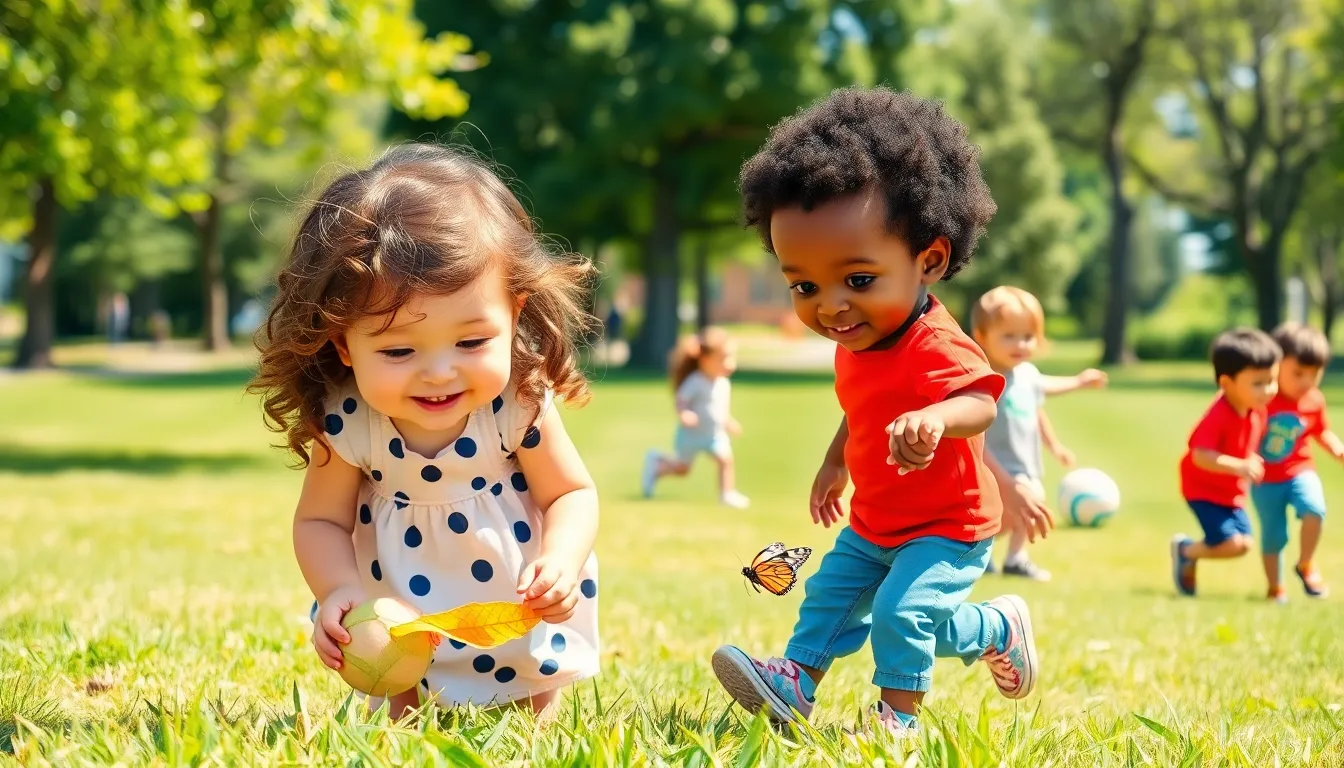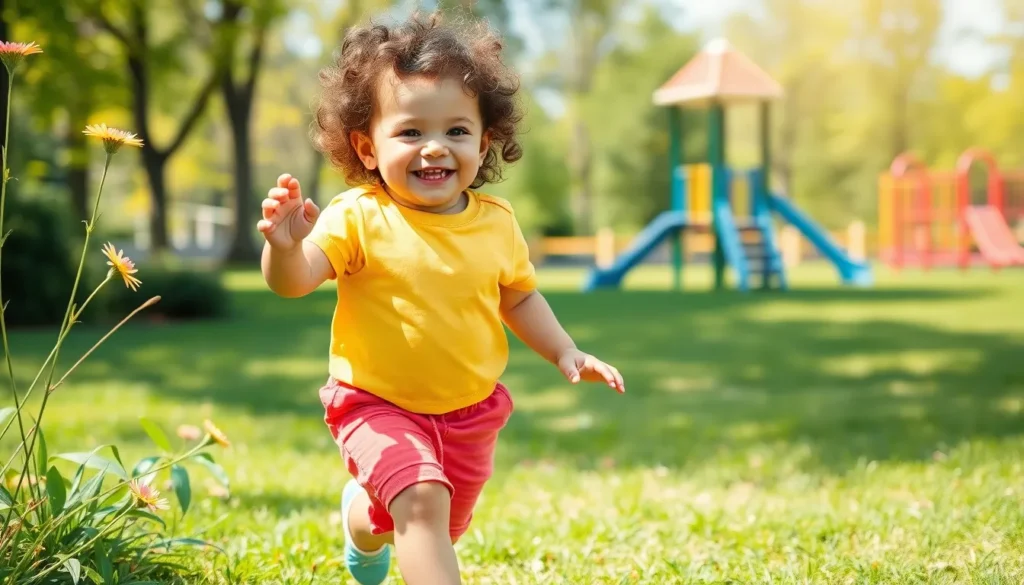When it comes to toddlers, outdoor play isn’t just a nice option—it’s a necessity! Picture this: tiny feet running wild, giggles echoing through the air, and those adorable little faces covered in dirt, grass, and pure joy. It’s not just a scene from a heartwarming movie; it’s the magic of outdoor play.
Table of Contents
ToggleThe Importance Of Outdoor Play For Toddlers
Outdoor play serves as a necessity for toddlers, offering crucial benefits for their overall development. Engaging in outdoor activities fosters joy and freedom, enhancing their growth in various aspects.
Physical Development
Outdoor play significantly boosts physical development. Activities like running, climbing, and jumping promote gross motor skills. Engaging with different surfaces, such as grass and sand, improves balance and coordination. More opportunities for active play contribute to healthy physical growth. Toddlers also strengthen muscles and bones during outdoor exploration. Frequent outdoor exposure lays the foundation for an active lifestyle that benefits them in the long term.
Cognitive Growth
Cognitive growth thrives through outdoor experiences. Natural environments stimulate curiosity and encourage exploration. Playing outside introduces toddlers to various sensory stimuli that enhance their cognitive skills. Problem-solving occurs naturally when children encounter obstacles during play, such as navigating a climbing structure. Observations of plants and animals ignite an interest in nature, fostering early learning. These experiences nurture creativity and critical thinking, essential for their overall brain development.
Social Skills Enhancement
Social skills enhancement emerges as toddlers interact during outdoor play. Group activities encourage sharing and cooperation among peers. Playing with others provides opportunities to learn about empathy and emotional regulation. Engaging in games that require teamwork cultivates communication skills. Outdoor environments often promote more unstructured play, allowing children to negotiate rules and resolve conflicts. These experiences form the foundation for strong relationships and effective social interactions as they grow.
Types Of Outdoor Play Activities

Outdoor play activities for toddlers include various forms that foster development while ensuring enjoyment. Engaging in different types of play stimulates their minds and bodies.
Nature Exploration
Nature exploration encourages toddlers to observe and interact with their environment. Activities like collecting leaves, observing insects, or examining plants promote curiosity. Little ones gain knowledge about ecosystems while developing motor skills through movement and climbing. Exposure to diverse natural elements sparks imagination and creativity, helping them build a connection with the world around them. Providing tools like magnifying glasses enhances their observational skills.
Active Games
Active games offer toddlers an excellent way to build strength and coordination. Tag, hide and seek, or simple relays improve cardiovascular health and stimulate teamwork. Children learn to follow rules, take turns, and develop social interactions during play. Running and jumping not only enhance gross motor skills but also provide a fun outlet for energy. Incorporating balls or hoops in these games adds a layer of excitement, fostering competitive spirit and encouraging sharing among peers.
Creative Play
Creative play enables toddlers to express themselves while interacting with nature. Activities like building forts from sticks or creating mud pies allow imagination to flourish. These experiences enhance problem-solving skills and boost cognitive development as children experiment with materials. Providing art supplies like chalk or paint encourages them to create unique masterpieces outdoors. Engaging in storytelling or role-playing during this creative time deepens social bonds and fosters communication skills among friends.
Safety Tips For Outdoor Play
Outdoor play for toddlers requires careful consideration of safety measures. Keeping children safe during their outdoor activities leads to a more enjoyable experience.
Choosing The Right Environment
Select play areas that are free from hazards. Soft surfaces like grass or rubber mats provide cushioning for falls. Ensure the space is fenced to prevent wandering. Look for locations away from busy roads and other potential dangers, ensuring a secure play atmosphere. Natural elements such as trees or bushes can serve as delightful exploration spots, but these should not hide any risks. Inspect play equipment for stability and age-appropriate features. Check for well-maintained structures that offer fun while minimizing injury risk.
Supervision Guidelines
Active supervision directly influences toddler safety during outdoor play. Stay within arm’s reach when toddlers explore their surroundings. Frequent checks on their activities ensure they remain safe. Establish clear boundaries so children understand where they can play. Encourage them to stay within sight to promote independence while providing security. Choose areas where adults can supervise multiple children easily. Engaging in play with toddlers enhances their experience and ensures safety at the same time.
Sun Safety Measures
Preventing sun-related health issues is pivotal during outdoor play. Apply sunscreen liberally on exposed skin at least 30 minutes before playing outside. Choose a broad-spectrum sunscreen with an SPF of 30 or higher. Reapply every two hours or immediately after swimming or sweating. Dress toddlers in lightweight, long-sleeved clothing to shield skin from harmful rays. Incorporate wide-brimmed hats and sunglasses for added protection. Regular breaks in shaded areas help prevent overheating and sunburn. Educating parents and caregivers on sun safety promotes a healthy approach to outdoor fun.
Incorporating Outdoor Play Into Daily Routines
Outdoor play is essential for toddlers, and incorporating it into daily routines makes a significant difference in their development.
Making Time For Outdoor Activities
Setting aside specific times for outdoor activities promotes consistency. Mornings can offer fresh air before daily tasks begin. Afternoons allow for play after lunch when energy levels are high. Weekends provide extended opportunities for families to explore parks or nature trails together. Planning these activities helps make outdoor play a regular part of a toddler’s day, fostering physical and social skills.
Involving Caregivers And Family
Involving caregivers and family members enriches the outdoor play experience. Caregivers can lead in setting up engaging activities, whether it’s playing tag or building a nature fort. Family members can participate, creating bonding moments while toddlers learn to share and cooperate. When everyone joins in, playtime becomes an enjoyable, family-centered event that reinforces supportive relationships.
Adapting To Weather Conditions
Adapting play activities to various weather conditions ensures that toddlers remain active year-round. Rainy days can introduce indoor options like water play or mud activities that encourage exploration. Hot days call for early morning play or shaded areas to keep children safe and comfortable. During colder months, dressing in layers lets toddlers enjoy outdoor time while protected from the elements. Flexibility in planning maintains a commitment to regular outdoor play, regardless of conditions.
Embracing outdoor play is vital for toddlers’ growth and happiness. It’s not just about having fun; it’s an essential part of their development. Through engaging in various activities, toddlers enhance their physical abilities, cognitive skills, and social interactions.
Creating opportunities for outdoor play fosters a love for nature and encourages curiosity. By incorporating safety measures and adapting activities to different weather conditions, caregivers can ensure a safe and enriching experience.
Ultimately, prioritizing outdoor play in daily routines nurtures healthy habits that last a lifetime. It lays the foundation for confident, well-rounded individuals ready to explore the world around them.



